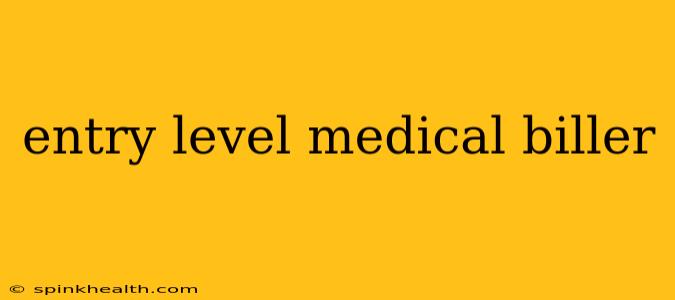Cracking the Code: Your Journey into Entry-Level Medical Billing
The world of healthcare is vast and complex, but behind the scenes, a vital role ensures the smooth flow of funds: the medical biller. If you're intrigued by the intersection of healthcare and finance, an entry-level medical billing position could be your perfect launchpad. This isn't just about numbers; it's about ensuring doctors and medical facilities get paid for the services they provide, ultimately contributing to the well-being of patients. Let's delve into what this career path entails.
What does a medical biller do?
Imagine yourself as a detective, meticulously piecing together medical records, insurance policies, and billing codes to ensure accurate claims submission. That's the essence of a medical biller's job. Your daily tasks might include:
- Reviewing patient charts: You'll examine medical records to identify the procedures and diagnoses performed, ensuring accuracy and completeness.
- Coding medical services: You'll use standardized medical codes (like ICD-10 and CPT codes) to translate medical procedures and diagnoses into a language insurance companies understand.
- Preparing and submitting claims: This involves entering the coded information into billing software and transmitting claims electronically to insurance companies.
- Following up on claims: You'll track the status of submitted claims, addressing denials and resubmitting corrected claims.
- Managing patient accounts: This includes addressing patient inquiries, explaining bills, and managing payment arrangements.
The work is detail-oriented and requires meticulous accuracy, but it's also incredibly rewarding to know you're playing a crucial role in the financial health of a medical practice.
What skills do I need for an entry-level medical billing position?
While formal education is helpful, many entry-level positions prioritize practical skills and a willingness to learn. Here's what employers typically look for:
- Strong attention to detail: Accuracy is paramount in medical billing. One small mistake can delay or prevent payment.
- Proficiency in medical terminology: Understanding medical terms and abbreviations is essential for interpreting patient records and coding accurately.
- Knowledge of medical billing software: Familiarity with billing software like Kareo, Athenahealth, or other industry-standard systems is highly advantageous.
- Excellent communication skills: You'll be interacting with patients, insurance companies, and medical staff, so clear and professional communication is key.
- Basic computer skills: Comfortable using computers, spreadsheets, and email is essential.
How can I get certified as a medical biller?
While not always required for entry-level positions, certification demonstrates your commitment to the profession and enhances your job prospects. Several reputable organizations offer medical billing and coding certifications, such as the American Academy of Professional Coders (AAPC) and the American Health Information Management Association (AHIMA). These certifications often involve passing exams after completing coursework or training programs.
What is the career path progression for a medical biller?
An entry-level medical billing role isn't just a starting point; it's a stepping stone to a potentially fulfilling career. With experience and further training, you could progress to:
- Senior Medical Biller: Handling more complex claims and supervising junior billers.
- Medical Billing Supervisor/Manager: Overseeing a team of billers and managing the overall billing process.
- Medical Coding Specialist: Focusing more on the coding aspect of medical billing.
- Revenue Cycle Management Specialist: Taking on a broader role encompassing all aspects of revenue generation for a medical facility.
What is the average salary for an entry-level medical biller?
Salary expectations vary depending on location, experience, and employer. However, entry-level medical billers can generally expect to earn a competitive salary that offers a good balance of work and compensation, with potential for growth as they gain experience and expertise.
The journey into medical billing might seem complex, but with dedication, attention to detail, and a passion for helping healthcare providers succeed, you can build a rewarding and stable career. So, are you ready to crack the code?

